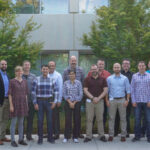|
|
 Mihir Shukla presents at Tech Field Day 19 |
This Presentation date is June 27, 2019 at 9:00-12:00.
Presenters: Abhijit Kakhandiki, Brendan Foley, Mihir Shukla, Steve Shah, Steve Van Lare
At Tech Field Day 19, Mihir Shukla introduced Automation Anywhere’s Robotic Process Automation (RPA) platform, emphasizing its potential to transform workplaces by automating repetitive tasks and freeing human workers for more creative roles. Abhijit Kakhandiki outlined the company’s product vision, highlighting the synergy between RPA and AI, and introducing products like the IQ Bot line for AI capabilities and Bot Insight for analytics. Steve Shah delved into the technical aspects of the platform, showcasing its user-friendly interface and integration with AI to build sophisticated enterprise automation solutions.
Automation Anywhere’s platform supports scalable and secure bot management for both attended and unattended scenarios, with features like secure password storage and detailed audit trails. The platform also enables developers to create sophisticated automation by integrating inline scripting and providing tools like debugging and version control. Additionally, the Bot Store allows developers to monetize their work through a subscription model, fostering a sustainable ecosystem for innovation.
Follow on Twitter using the following hashtags or usernames: #TFD19
Automation Anywhere Introduction to RPA
Watch on YouTube
Watch on Vimeo
Mihir Shukla welcomes the Tech Field Day audience. He illustrates the business imperative in adopting the RPA platform to building a Digital Workforce.
In his presentation at Tech Field Day 19, Mihir Shukla underscores the journey and vision behind Automation Anywhere and its Robotic Process Automation (RPA) platform. He describes his own evolution from a passionate developer who initially saw programming as a form of art to an innovator aiming to solve the significant inefficiencies created by using human labor to connect disparate software applications. This realization led him to found his sixth startup, focusing on what is now known as RPA, which aims to turn every application’s interface into a virtual API, effectively allowing for widespread automation.
Shukla highlights the transformative potential of automation in the workplace, arguing that automating routine and repetitive tasks can free human workers from “robotic” jobs and enable them to engage in more creative and meaningful activities. The Automation Anywhere platform democratizes automation by making it accessible not only to developers but also to business users, thus broadening the impact and utility of the technology. By leveraging AI and an ecosystem of third-party developers through the Automation Anywhere Bot Store, the company envisions a future where digital assistants are ubiquitous, significantly altering the nature of work.
The long-term vision presented by Shukla is ambitious and optimistic. He imagines a world where every job is augmented by a digital assistant, leading to a significant increase in the number of roles requiring higher levels of creativity and innovation. Shukla stresses the societal importance of this shift, envisioning a future where technology not only enhances productivity and efficiency but also fundamentally redefines what work is. This vision aligns with a broader goal of creating a more fulfilling and democratized workforce, where technology serves as a powerful equalizer and enabler of human potential.
Personnel: Mihir Shukla
Automation Anywhere Portfolio and Roadmap
Watch on YouTube
Watch on Vimeo
Abhijit Kakhandiki will share the latest advancements in Digital Workers as it pertains to ready-to-deploy digital personas with higher cognitive/analytical abilities than contemporary bots plus how to implement them in the cloud. In the presentation, Abhijit Kakhandiki, who leads products and engineering for Automation Anywhere, outlines the company’s comprehensive product vision which intertwines Robotic Process Automation (RPA) with Artificial Intelligence (AI). He explains how the synergy between RPA and AI is pivotal, with RPA feeding data and context to AI, which in turn enhances RPA by extracting signal from noise. The broader vision focuses on delivering a versatile digital workforce platform that can suit small to large enterprises, allowing them to scale and personalize their services. The platform’s versatility is emphasized through its capability to be utilized by varying roles within companies, from business people to IT professionals and bot developers, across different consumption models (public cloud, private cloud, or on-premise).
Kakhandiki elaborates on the different stakeholders involved in deploying a digital workforce successfully: business users, IT, and developers. Business users prioritize ease of use, ROI, and maximum process automation incorporating decision-making powered by AI. IT’s concerns revolve around scalability, security, and the smooth integration of the platform into their enterprise ecosystem, ensuring centralized control and the prevention of bots going rogue. Developers, ranging from novice business users to advanced programmers, benefit from features like drag-and-drop bot creation and the option to build more sophisticated bots using Java or Python, which promotes better engagement with the platform from varying skill levels. The three principles guiding their product vision—working for any size company, being adoptable by anyone, and providing flexible deployment options—are critical to meeting these diverse stakeholder needs.
Touching on the portfolio, Kakhandiki introduces a suite of products like the IQ Bot line for AI capabilities and Bot Insight for business and operational analytics. The IQ Bot line focuses on enabling bots to learn from transactions, thereby increasing their intelligence and adapting over time. Bot Insight provides critical insights across human and bot activities, aiding in the identification of patterns and potential business growth opportunities. The platform’s support for thousands of bots is underscored, addressing the need for effective management, scalability, and cost optimization. Additionally, Kakhandiki emphasizes the role of their bot store, which features a plethora of bots, many developed by partners, and the release of the command SDK for developers to contribute and monetize their own automation commands. The platform is designed to provide end-to-end AI model lifecycle support, facilitating complex automations and enabling businesses to leverage domain intelligence for tasks such as mortgage processing and customer service inquiries.
Personnel: Abhijit Kakhandiki
Automation Anywhere Product Deep Dive
Watch on YouTube
Watch on Vimeo
Steve Shah covers the technical aspects for using RPA in combination with AI to reengineer the future with the industry’s most sophisticated architecture and secure RPA platform.
Steve Shah, head of the RPA product team at Automation Anywhere, gave an in-depth presentation at Tech Field Day 19, emphasizing how RPA can be seamlessly integrated with AI to build the next generation of enterprise automation. Shah highlighted the platform’s user-friendliness, making it accessible even for non-programmers who typically engage in Excel or basic function writing. He stressed how ease of use is paramount for business users and IT operators, allowing them to construct bots using intuitive web interfaces, drag-and-drop functionalities, and logical flowcharts. This approach reduces the learning curve and enables rapid adoption and deployment within organizations.
On the IT operations front, Shah discussed the importance of scalable and secure bot management, including governance and cost-efficiency. As businesses expand RPA usage, managing thousands of bots requires robust governance, security policies, and an efficient infrastructure to ensure seamless operation. He pointed out that Automation Anywhere’s platform addresses these needs by supporting both attended and unattended bot scenarios, with tools for secure password storage, detailed audit trails, and integrations with industry-standard security systems like CyberArk. Additionally, the architecture supports both on-premise and cloud deployments, providing flexibility and adherence to privacy standards.
Shah also addressed developers, emphasizing the newly introduced ability to integrate inline scripting within bots, supporting languages like Python and VBScript. This capability allows developers to create sophisticated automation by marrying business process workflows with powerful machine learning libraries. The addition of developer-centric features such as debugging tools, version control, and diff tools ensures that the platform can cater to complex automation needs, capable of connecting with both modern SaaS applications and legacy systems. Automation Anywhere aims to facilitate a collaborative environment where varied expertise—ranging from business users to seasoned developers—can harness the platform’s capabilities to its fullest.
Personnel: Steve Shah
Automation Anywhere The New AI Augmented RPA
Watch on YouTube
Watch on Vimeo
Steve Van Lare, Head of Cognitive Solutions at Automation Anywhere, introduces the concept of AI-augmented Robotic Process Automation (RPA) in a presentation at Tech Field Day 19. Van Lare underscores that RPA is the top delivery vehicle for AI, particularly when incorporating cognitive aspects that allow software to learn and improve over time. He highlights that Automation Anywhere’s RPA system is open and highly integrative, allowing seamless connection with other AI tools and platforms such as Google AI and Microsoft’s cognitive tools. One of the flagship products discussed is the IQ Bot, a cognitive tool designed to process documents, adapting and learning from new data continuously.
Van Lare elaborates on the architecture that underpins AI-augmented RPA solutions at Automation Anywhere, emphasizing how RPA facilitates the integration and deployment of AI components. He describes how custom-built tools and third-party solutions can be assembled into complete RPA skills, covering a range of functionalities like image recognition, NLP, and data extraction. By enabling business users to upload sample documents and train AI models without needing extensive technical expertise, these solutions streamline previously manual and repetitive tasks into automated workflows. For example, the IQ Bot can transform shipping and billing documents into structured data that can be easily inputted into enterprise systems like SAP or Oracle.
The presentation also touches on the flexibility and deployment strategies of AI skills within RPA frameworks. Van Lare mentions the efficiency of RPA in handling both the intensive training phase, often carried out on high-power GPU systems, and the execution phase, which can happen on less powerful, distributed devices. Furthermore, the Bot Store allows distribution and reuse of these trained AI models, ensuring broad accessibility and ease of deployment. A case study involving mortgage applications illustrates how these AI-augmented RPA systems can significantly enhance efficiency by automating straightforward cases while allowing human agents to focus on more complex decisions, thereby optimizing overall operational productivity.
Personnel: Steve Van Lare
Automation Anywhere Bot Marketplace and Monetization
Watch on YouTube
Watch on Vimeo
Brendan Foley will showcase the opportunity and resources for developers that Automation Anywhere provides, covering Community Edition, Developer Documentation and Bot Games, Developer Community (APeople), Automation Anywhere University, and Bot Store Monetization. Brendan Foley, who manages product for the Bot Store and oversees developer evangelism, explains Automation Anywhere’s strategy to engage a wide range of developers—from business professionals and IT teams to independent software vendors (ISVs). The aim is to establish the platform as a frontrunner in the intelligent automation sector, likening its ambition to the status enjoyed by Microsoft, Google, Twilio, and Salesforce. Foley underscores the growing market for intelligent automation, noting that Automation Anywhere’s platform is widely adopted by over 2,800 large enterprises in more than 90 countries.
A key component of this strategy is the Community Edition, a free version of Automation Anywhere’s software suite, allowing developers to explore tools for robotic process automation (RPA), artificial intelligence (AI), analytics, and more. Additionally, the company provides extensive documentation accessible through docs.automationanywhere.com, encompassing resources for both novices and advanced developers. Another highlight is the “bot games,” competitions designed to incentivize developers to innovate using the platform. These competitions are held both virtually and in person across several international locations, fostering a sense of community and rapid skill acquisition.
Automation Anywhere also places significant emphasis on community and education through resources like the developer community APeople and Automation Anywhere University. APeople offers forums where developers can seek advice and share insights, while the University offers free courses to help users achieve fast-track accreditation or comprehensive certification. For developers aiming to build a business, the Bot Store is presented as a marketplace where they can monetize their work through a subscription model. Scheduled to enable monetization by the end of the summer, the Bot Store promises lucrative opportunities for developers, with Automation Anywhere handling billing and offering IP protection for submitted bots. This strategy aims to create a sustainable ecosystem where developers can thrive and continuously innovate.
Personnel: Brendan Foley









